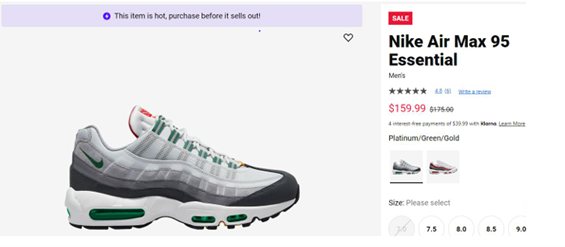According to the plaintiff, Foot Locker’s use of misleading marketing materials and other “dark patterns” is intended to induce sales and create a false sense of urgency. The complaint seeks class certification and a jury trial on all issues, along with monetary, statutory, and/or punitive damages, costs and expenses, and reasonable fees for attorneys and experts.
Foot Locker Being Stomped on for Alleged Misleading Sales
The class action complaint alleges that Foot Locker promotes sales through “urgency dark patterns” both online and in brick-and-mortar stores, meaning that Foot Locker is misleading consumers to believe that if a product is not bought quickly, it will become unavailable. To substantiate these allegations, the complaint includes photographs, such as the one below, of advertisements describing products as “hot” and urging customers to “purchase before it sells out.” Despite these advertisements, however, the complainants insist that an examination of Foot Locker’s actual inventory would indicate that the relevant products were not at risk of becoming unavailable.

The plaintiffs further assert that in many instances, prices that are being advertised as sales “aren’t really discounts at all,” but rather attempts to mislead customers. The complaint goes onto allege that Foot Locker is comparing sale prices to fictitious original prices rather than bona fide original prices thereby giving consumers a false bargain.
Indeed, the Federal Trade Commission (FTC) regulations on false and deceptive advertising hold that former price comparisons are only proper when the non-sale price listed is the actual, bona fide price at which the product was offered to the public on a regular basis for a reasonably substantial period of time. Here, the complainants claim that Foot Locker uses artificial and inflated prices as the original prices in order to advertise inflated discounts.
Next Steps
This case is part of a wave of litigation and regulatory enforcement targeting so-called dark patterns, which the FTC describes as sophisticated design practices that can trick or manipulate consumers into buying products or services or giving up their privacy. Companies should carefully review their marketing methods, including online and in-store, to ensure that they can substantiate any claims that products are in short supply and that sales prices are based on true price reductions. Advertising counsel’s review is a useful tool in assuring compliance with FTC advertising regulations and avoiding dark-pattern tactics.
Our team will be monitoring this class action lawsuit as it unfolds and will continue to provide updates as they become available.





 />i
/>i

